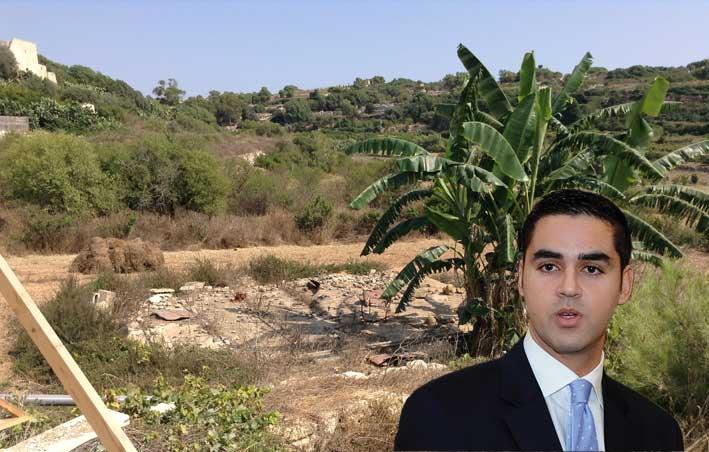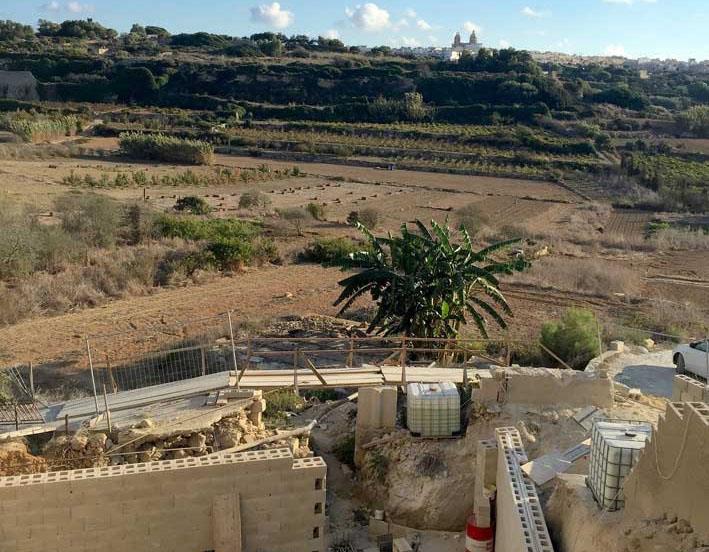The court has found testimony delivered by Transport Minister Ian Borg in a libel case instituted by a third party against The Malta Independent to be ‘hard to believe’.
The case dealt with the sale of a piece of land in Dingli back in 2014, by a man with mental health issues to then Parliamentary Secretary Ian Borg.
Mark Farrugia had filed a libel case against Rachel Attard, Stephen Calleja and David Lindsay on behalf of The Malta Independent on Sunday over an article titled ‘Family incensed as PS buys land from mentally-ill father’ that was published in 2015. Farrugia was one of the middlemen in the sale. The court ruled in favour of The Malta Independent.
The article dealt with the family of Dingli resident Anthony Scicluna who were considering taking legal action in a bid to reverse the sale of a property to then Parliamentary Secretary Ian Borg.
The land in question is in Rabat's picturesque Santa Katerina valley, close to another property Borg also purchased. The 655 square metre property, roughly the size of a football pitch's penalty area and which Scicluna's family say has been owned and tilled by them for generations, was sold for the measly sum of €10,000 and without the family's knowledge. The family had insisted that Borg knew of the Scicluna's mental health condition toward the end of 2013 when middlemen, one of whom was the Scicluna's own nephew (Farrugia), began approaching him on Borg's behalf to purchase the land.
Family members who at the time had spoken with this newspaper claimed that on 10 January 2014, a Friday, Scicluna left his family home and did not return until the early hours of Monday morning. Scicluna reportedly spent that weekend in the company of Franco Sammut and Mark Farrugia, the two middlemen they say (and according to the sale contact, were acting on Borg's behalf) took him from bar to bar in Dingli and Rabat plying him with alcohol, which Scicluna cannot drink because of his medication, in an all-out bid to convince him to sell the land. The article read that Scicluna later that weekend informed the family that he sold the land. It was also reported that in the early hours of the morning of 13 January, a Monday, that Scicluna returned home, took a shower and changed his clothes. He was then reportedly picked up by the two middlemen at 7am and was escorted to Notary Anton Borg for an early morning meeting. It was over this content that Farrugia filed a libel suit.

During the court case, Scicluna's children said that their father suffered from mental conditions for 25 years, and one of them also mentioned that her father suffered from alcohol and gambling addiction. Scicluna's wife also said that her husband suffers from mental illness and had even spent time at Mt Carmel Hospital.
A psychiatrist also testified and said that Scicluna was under her care for 12 years, saying that he suffers from schizoaffective disorder.
Farrugia was asked whether he knew his uncle had health problems, answered that he did not know. He denied ever knowing that his uncle had recovered at a mental health hospital and said he could not know as the respective families did not talk to each other. He also denied knowing that his uncle had an alcohol problem, despite one of Scicluna's children saying otherwise.
Minister Ian Borg had said that he had long known Anthony Scicluna for around 18 years. He said that he knew Scicluna had family problems in the past with his wife and some of her children and that Scicluna has signed at least 6 other contracts in past years without anybody doubting his capacity.
The court said that while Scicluna was drinking in Paceville on the night between the Saturday and Sunday and that he went to drink at the Dingli Labour Party club on Sunday morning, it was not proven that Farrugia had taken Scicluna out drinking. The court also said that it was not proven that Sammut and Farrugia had picked him up on the Monday morning. However, the court said that it could not just consider these two declarations on their own without weighing them in the context of the whole article.
The court, presided by Magistrate Victor Axiaq, noted that the gist of the article was the act by Ian Borg and not what the middlemen did. The court also said that the protagonist of the story was Ian Borg and not Farrugia.

The court said that it has no doubt that the testimony of Scicluna's family and the psychiatrist was right, that the individual had for a long time suffered from serious mental health problems that, even in the best of moments, did not allow him to take wise decisions and made him vulnerable to being influenced by others.
The court did not find Ian Borg's statement, and that of Farrugia, that they did not know about the state of Scicluna's mental health, credible.
The court said that while Farrugia said that their families did not talk between them, it found it very doubtful and unbelievable that in a small town like Dingli the people did not know that one of their own, someone who was apparently well known, had mental health problems so large that required him to spend time in recovery at Mt Carmel Hospital. "This applies even more too family and even more so when they live in the same locality."
It is pertinent to note that Ian Borg contests on the electoral district that includes Dingli and was also Mayor of the locality for a time.
"The court also finds it very difficult to believe that Ian Borg, who admitted to knowing Scicluna for around 18 years and knew of his problems with his family, could not then know of the state of his mental health."
The court said that, tied to Scicluna's mental health, is the fact that after weeks if not months of attempts to convince Scicluna to sell the property to Borg, in a single day "essentially the day when for some reason or other Scicluna finally decided to sell the land - Farrugia, Borg, Sammut and the notary managed to finalise the contract in less than 24 hours.
"Even if the court were to accept the best hypothesis, namely that there was nothing planned between Borg and the middlemen to put unjust pressure on Scicluna to sell the land against his will, the fact that Farrugia and Borg knew (and as the court already said it does not believe that they did not know) that they had a vulnerable individual before them who suddenly decided to sell his land for a price which the court did not find was at market value, it became imperative that they ascertained what his true wishes were, if need be with professional assistance, prior to him making that agreement."
The court found that the subject of the article in question merits public scrutiny and was in the public interest to be published.
The court said that the comments and the declarations made in the article, although two of them (with regards to Farrugia) were incorrect, were substantially the truth in the context of the whole article. The court also found that the article was honest opinion and cannot say that its publication was bad or that it intended to damage anyone.
The court decided that the article consisted of fair comment regarding an issue of public interest.
Lawyer Peter Fenech appeared on behalf of The Malta Independent.